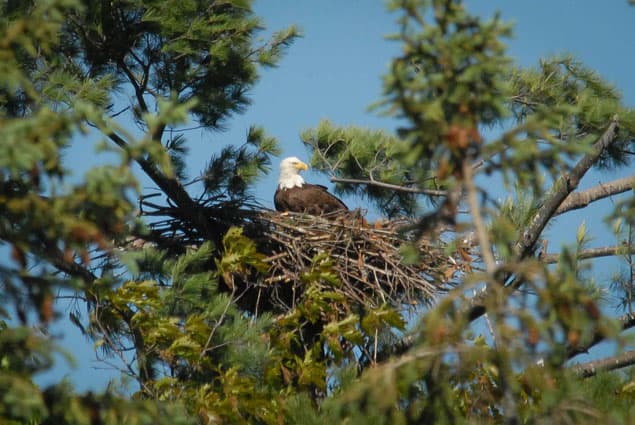A bald eagle sits on a nest near Barnet along the Connecticut River. Bald eagles, once endangered, are now on the rise.
During the 2014 nesting season,Vermont’s loon population had a record success, producing 65 fledglings (chicks that survived to leave the nest) on lakes and ponds throughout the state.
Loons faced dramatic declines in the 20th century mostly due to shoreline development and human disturbance of loon habitat, but were removed from Vermont’s endangered species list in 2005 following decades of recovery efforts.
Peregrine falcons, which also were removed from Vermont’s endangered species list in 2005, saw similarly strong nesting success this year.
“Rare birds such as peregrine falcons and loons are very sensitive to human disturbance while nesting,” said biologist John Buck, non-game bird project leader for the Fish & Wildlife Department. “They nest only in a few specific habitats, so they need to find these in undeveloped places that are away from people.”
Conversely, 2014 was a down year for the state’s nesting bald eagles, which produced only 17 fledglings, down from a modern-day record of 26 fledglings last year. Buck said that the off year was likely due to lingering winter weather and is not a reason for concern at this point because of the large number of adult eagles spotted throughout the state. Bald eagles are no longer a federally endangered species, but they are still listed under Vermont’s Endangered Species Act, as the birds have been slower to recover in the state.
“A single down year for bald eagle nesting is not a major concern at this point, as nesting success will vary from year to year due to fluctuations in weather or food,” said Buck. “We remain optimistic about the future of eagles in Vermont due to the widespread reports we have received of adult eagles throughout the state.”
Vermont’s rare birds are monitored in a cooperative agreement between the Fish & Wildlife Department and its conservation partners, Vermont Center for Ecostudies and Audubon Vermont. Other monitored bird species saw mixed nesting success this year. Common terns produced only 16 fledglings out of 220 nests, due in part to depredation by gulls and great-horned owls on the nests. The grasshopper sparrow and black tern appeared to be stable in their small and limited habitats.
“The return of loons and peregrines to Vermont is one of the state’s great conservation success stories, but much remains to be done,” said Buck. “The continued support from our partners and from the citizens of Vermont is critical for the future success of these important species.”
Vermonters can help researchers in their effort to conserve birds by donating online to the non-game wildlife fund at www.vtfishandwildlife.com/support_nongame.cfm or by purchasing a newly redesigned conservation license plate, available in October.
Photo by John Hall, VT Fish & Wildlife




